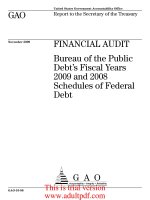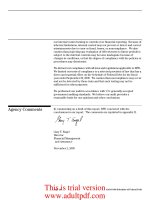United States Government Accountability Office GAO November 2009 Report to the Secretary of the Treasury_part1 pdf
Bạn đang xem bản rút gọn của tài liệu. Xem và tải ngay bản đầy đủ của tài liệu tại đây (108.38 KB, 2 trang )
a
GAO
United States Government Accountability Office
Report to the Secretary of the Treasury
November 2009
FINANCIAL AUDIT
Bureau of the Public
Debt’s
Fiscal Years
2009 and 2008
Schedules of Federal
Debt
GAO-10-88
This is trial version
www.adultpdf.com
What GAO Found
United States Government Accountability Office
Why GAO Did This Study
Highlights
Accountability Integrity Reliability
November 2009
FINANCIAL AUDIT
Bureau of the Public Debt's Fiscal Years 2009 and
2008 Schedules of Federal Debt
Highlights of GAO-10-88, a report to the
Secretary of the Treasury
GAO is required to audit the
consolidated financial statements
of the U.S. government. Because of
the significance of the federal debt
held by the public to the
governmentwide financial
statements, GAO audits the Bureau
of the Public Debt’s (BPD)
Schedules of Federal Debt
annually. The audit of these
schedules is done to determine
whether, in all material respects,
(1) the schedules are reliable and
(2) BPD management maintained
effective internal control over
financial reporting relevant to the
Schedule of Federal Debt. Further,
GAO tests compliance with a
significant provision of law related
to the Schedule of Federal Debt
(statutory debt limit).
Federal debt managed by BPD
consists of Treasury securities held
by the public and by certain federal
government accounts, referred to
as intragovernmental debt
holdings. The level of debt held by
the public primarily reflects how
much of the nation’s wealth has
been absorbed by the federal
government to finance prior federal
spending in excess of federal
revenues. Intragovernmental debt
holdings represent balances of
Treasury securities held by federal
government accounts, primarily
federal trust funds such as Social
Security, that typically have an
obligation to invest their excess
annual receipts over disbursements
in federal securities.
In GAO’s opinion, BPD’s Schedules of Federal Debt for fiscal years 2009
and 2008 were fairly presented in all material respects, and BPD
maintained effective internal control over financial reporting relevant to
the Schedule of Federal Debt as of September 30, 2009. GAO found no
instances of noncompliance in fiscal year 2009 with the statutory debt
limit.
As of September 30, 2009 and 2008, federal debt managed by BPD totaled
about $11,898 billion and $10,011 billion, respectively. As shown in figure
1 below, total federal debt increased over each of the last 4 fiscal years.
During the last 4 fiscal years, managing the federal debt has continued to
be a challenge as evidenced by the growth of total federal debt by $3,980
billion, or 50 percent, from $7,918 billion as of September 30, 2005, to
$11,898 billion as of September 30, 2009. The increase to the federal debt
has become particularly acute since the onset of the recession in
December 2007. Federal government actions in response to both the
financial market crisis and the economic downturn have added
significantly to Treasury’s borrowing needs. The fiscal year 2008 increase
in total federal debt of $1,018 billion was the largest annual dollar increase
in history; only to be surpassed by the fiscal year 2009 increase of $1,887
billion. During fiscal years 2008 and 2009, legislation was enacted to raise
the statutory debt limit on three different occasions. During this period,
the statutory debt limit went from $9,815 billion to its current level of
$12,104 billion, an increase of 23 percent.
For a fuller understanding of GAO's opinion
on BPD's fiscal years 2009 and 2008
Schedules of Federal Debt, readers should
refer to the complete audit report, available by
clicking on GAO-10-88, which includes
information on audit objectives, scope, and
methodology. For more information, contact
Gary T. Engel at (202) 512-3406 or
This is trial version
www.adultpdf.com









